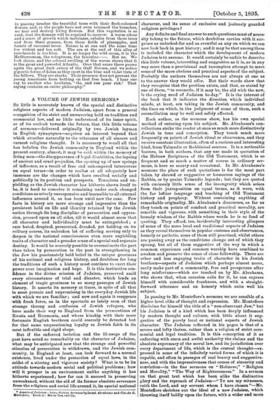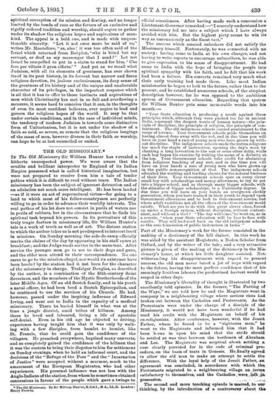A VOLUME OF JEWISH SERMONS.*
• Aspeafa of Jact,ians being Sixteen SerntOns byliraal Abrahams and Claude G. Xantejiatra. Loadox I Ilacmilan and Co. So little is accurately known of the special and distinctive religious aspects of modern Judaism, apart from a general recognition of its strict and unwavering hold on tradition and ceremonial law, and so little understood of its inner spirit, or of its outlook towards the future, that this little volume of sermons—delivered originally by two Jewish laymen in English synagogues—acquires an interest beyond that which attaches naturally to the utterance of all sincere and earnest religions thought. It is necessary to recall all that has befallen the Jewish community in England within the present century, almost, it may be said, within the memory of living men—the disappearance of legal disabilities, the lapsing of ancient and cruel prejudice, the opening up of new springs of inflaence„ as a result of free and unhampered intercourse on equal terms—in order to realise at all adequately how immense are the changes which have resulted socially and politically in its position and prospects. Tenacious and un- yielding as the Jewish character has hitherto shown itself to be, it is hard to conceive it remaining under such changed conditions as utterly unresponsive and insensible to all external influences around it, as has been until now the case. Few -facts in history are more strange and impressive than the persistent hold on life and identity retained by the Jewish nation through its long discipline of persecution and oppres- sion, pressed upon on all sides, till it would almost seem that all character and individuality must be extinguished ; a race hated, despised, persecuted, dreaded, yet holding on its solitary course, its unbroken lot of suffering serving only to .deepen in the national consciousness even more unyielding traits of character and a prouder sense of a special and separate destiny. It would be scarcely possible to overestimate the part thus taken by persecution in the past in strengthening in the Jew his passionately held belief in the unique greatness • of his national and religious history, and doubtless for long the traditions of such a history must continue to exert their power over imagination and hope. It is this instinctive con- fidence in the divine mission of Judaism, preserved amid every circumstance of trial and disaster, which lends an element of tragic greatness to so many passages of Jewish history. It asserts its memory at times, in spite of all that is most prosaic and unpromising in the everyday Jewish life .with which we are familiar ; and now and again it reappears -with fresh force, as in the spectacle so lately seen of that -strange throng and confusion of Jewish refugees, who have made their way to England from the persecutions of Russia and Roumania, and whose kinship with their more fortunate English brethren could scarcely be detected but for that same unquestioning loyalty to Jewish faith in its
• most inflexible and rigid shape.
But if the enforced isolation and the ill-usage of the ;past have acted so remarkably on the character of Judaism, what may be anticipated now that the strange and powerful .stimulus of persecution is withdrawn, and the Jewish com- munity, in England at least, can look forward to a normal -existence, lived under the protection of equal laws, in the midst of a stirring and vigorous society ? What is to be its attitude towards modern social and political problems ; how will it prosper in an environment unlike anything it has hitherto experienced ; how far can it succeed in preserving tunve,akened, without the aid of its former absolute severance from the religions and social life around it, its special national character, and its sense of exclusive and jealously guarded religions privileges ?
Any definite and final answer to such questions must of neces- sity belong to the future, which doubtless carries with it Bur- prises as unlooked-for and as eventful as any on which we can now look back in past history ; and it may be that among them is included the character which the development of modern Judaism is to assume. It would certainly be unfair to describe this little volume, interesting and suggestive as it is, as in any way more than a provisional and incomplete attempt to meet some of the more obvious and practical aspects of the subject. Probably the authors themselves are pot always at one as to the answer they would offer. But their words show that they recognise that the problem exists, and that, as stated by one of them, "to reconcile, if it may be, the old with the new, is the crying need of Judaism to-day." It is the interest of the book that it indicates the direction which individual minds, at least, are taking in the Jewish community, and the lines on which, in the judgment of some of them, such a reconciliation may be well and safely effected.
Each author, as the sermons show, has his own special method of entering upon his subject. Mr. Abrahams's con- tributions strike the reader at once as much more distinctively Jewish in tone and conception. They touch much more frequently on points of Jewish ritual or observance, and they receive constant illustration, often of a curious and interesting kind, from Talmudic or Rabbinical sources. It is a noticeable feature, in both authors, that any use made in quotation of the Hebrew Scriptures of the Old Testament, which is so frequent and so ,much a matter of course in ordinary ser- mons, is here so scanty and occasional. In Mr. Abrahams's sermons the place of such quotations is for the most part taken by shrewd or suggestive or humorous sayings of the Rabbis, or by quaint Talmudic legends ; but they are quoted with curiously little sense of the incongruity which arises from their juxtaposition on equal terms, as it were, with the far loftier language and teaching of Old Testament history and prophecy. Without containing anything of remarkable originality, Mr. Abrahams's discourses, as far as they touch on points of conduct and practical morality, are sensible and vigorous, with something in their style of the homely wisdom of the Rabbis whose words he is so fond of quoting. They afford, too, incidentally interesting glimpses of some of the more local and traditional aspects of Judaism as they reveal themselves in popular customs and observances, homely or pathetic, some of them still practised, whilst others are passing away as the conditions change out of which they sprang, but all of them suggestive of the way in which a common experience and common worship have combined to awaken and preserve the sense of close fellowship. There are other and less engaging traits of character in his Jewish brethren—aspects of Judaism which perhaps almost neces. eerily make part of a community, free and prosperous after long misfortune—which are touched on by Mr. Abrahams, who shows that, when occasion calls for it, he can express himself with considerable frankness, and with a straight- forward utterance and an honesty which suits well his subject.
In passing to Mr. Montefiore's sermons we are sensible of a higher level alike of thought and expression. Mr. Montefiore disclaims for himself the title of a "non-observant Jew," but his Judaism is of a kind which has been deeply influenced by modern thought and culture, with little about it sug- gestive of the purely local or national aspects of Jewish character. The Judaism reflected in his pages is that of a severe and lofty theism, rather than a religion of strict cere- monial and legal tradition. It is this conception of it as enforcing with stern and awful authority the claims and the absolute supremacy of the moral law, and its jurisdiction over every department of life, which is the central thought—ex- pressed in some of the infinitely varied forms of which it is capable, and often in passages of real beauty and suggestive- ness, and with the impressiveness that comes of sincerity and conviction—in the fine sermons on "Holiness," "Religion and Morality," The Way of Righteousness." In a sermon on that great text which has been alike the distinctive glory and the reproach of Judaism—" Ye are my witnesses, Faith the Lord, and my servant whom I have chosen "—Mr. Montefiore sketches out the ideal of a new Judaism, which throwing itself boldly upon the future, with a wider and more
spiritual conception of its mission and destiny, and no longer limited by the bonds of race or the fetters of an exclusive and rigidly ordered tradition and worship, should aspire to gather under its shadow the religions hopes and aspirations of man- kind. The appeal is a bold one, and is made with unques- tionable sincerity. "Let it not once more be said of us," writes Mr. Montefiore, "as, alas ! it was too often said of the Israel which returned from Babylon, who is blind but my servant, or deaf as my messenger that I send ?' Let not Israel-be compelled to put in a claim to stand for him, Ohs fece per viltate il gran rifiuto.' " And yet as we recall what Judaism, with all its elements of greatness, has ever shown itself in its past history, in its fervent but narrow and fierce religious devotion, its jealous exclusiveness, its deep sense of the greatness of its history and of the unique and unalterable character of its privileges, in the imperfect response which is all that it has to offer to those instincts and aspirations of men which Christianity has met in so full and overflowing a measure, it seems hard to conceive that it can, in the thoughts of even its most confident believers, ever aspire to lead and govern the religious hopes of the world. It may be that under certain conditions, and in the case of individual minds, the tendency of modern Judaism is towards some distinctive form of Unitarianism, but it is not under the shadow of a faith so cold, so severe, so remote that the religious longings of the mass of men, however diverse in their faith or worship, can hope to be at last reconciled or united.







































 Previous page
Previous page